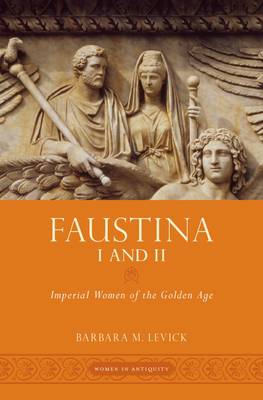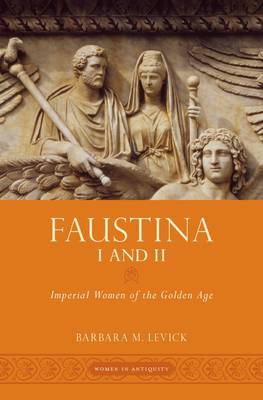
- Afhalen na 1 uur in een winkel met voorraad
- Gratis thuislevering in België vanaf € 30
- Ruim aanbod met 7 miljoen producten
- Afhalen na 1 uur in een winkel met voorraad
- Gratis thuislevering in België vanaf € 30
- Ruim aanbod met 7 miljoen producten
Zoeken
Omschrijving
The Roman empress Faustina the Elder (c. 97-140) and her daughter Faustina II (c. 130-175) have been subject to criticism from the earliest records, described in turn as fickle, unfaithful, and treasonous. Yet their husbands, the emperors Antoninus Pius and Marcus Aurelius, have reputations as golden as that of the whole Antonine age and seem to have thought favorably of them as prolific mothers, loyal spouses, and useful complements to the military and political proceedings of the empire. On the most basic level of lineage and procreation, the two women were naturally important for establishing the Antonine dynasty. Yet, the Faustinae, as they are commonly referred, also proved instrumental in solidifying in Roman minds the image of a nurturing and harmonious empire. Barbara M. Levick's Faustina I and II carefully synthesizes the many competing sources on the Faustinae into one comprehensive study, demonstrating the extent to which women could and did influence both the internal workings and external standing of the imperial dynasty. The book traces Faustina I's formation of her family's heritage amid a new empire through to Faustina II's enhancement of that legacy, focusing especially on the younger Faustina's deep involvement in palace politics and her possible role in the revolt of Avidius Cassius in 175. Through an analysis of everything from textual evidence to portraiture and coin inscriptions, this study ultimately evokes these two women whose exact biographies are not always certain, but whose relevance to their contemporaries and current scholarship is perfectly distinct.
Specificaties
Betrokkenen
- Auteur(s):
- Uitgeverij:
Inhoud
- Aantal bladzijden:
- 272
- Taal:
- Engels
- Reeks:
Eigenschappen
- Productcode (EAN):
- 9780195379419
- Verschijningsdatum:
- 1/03/2014
- Uitvoering:
- Hardcover
- Formaat:
- Genaaid
- Afmetingen:
- 160 mm x 236 mm
- Gewicht:
- 498 g

Alleen bij Standaard Boekhandel
+ 418 punten op je klantenkaart van Standaard Boekhandel
Beoordelingen
We publiceren alleen reviews die voldoen aan de voorwaarden voor reviews. Bekijk onze voorwaarden voor reviews.











